In the EU Archipelago Project, Delft University of Technology (TU Delft) and Kwadaso Agricultural College (KAC) in Ghana have teamed up to improve entrepreneurial and horticultural education and create jobs in the horticulture sector.
The partnership is focused at the agricultural college and is supported by the local subcontractor Holland Greentech Ghana (HGT). Kwadaso Agricultural College and Holland Greentech have assembled a strong team including the Projects’ Office and the Horticulture Department at KAC, the Kumasi Business Incubator of the Kwame Nkrumah University of Science and Technology (KNUST), working together with the regional HGT office in Kumasi and the national office in Accra. By making the education at KAC more practical and innovative, the vision is to turn KAC into a Centre of Excellence for horticulture and an example for other agricultural colleges.
Greenhouses
Most farming in Kumasi is open field while in Accra there is a large interest in greenhouses and protected horticulture. HGT Ghana has expertise in both areas and brings this to the implementation of the partnership.
TU Delft, KAC and KBI have introduced a 4-month training course delivered at KAC with a focus on practical skills in entrepreneurship and horticulture for participants and jobs in the horticultural sector. In the second week of March, 2021, TU Delft formally undertook a training of trainers, and the second iteration of the training program for youth, women and returnee migrants started on March 23, 2021 with the kick-off event 3 days afterwards.
 Kwadaso Agricultural College staff, principal & students, with Holland Greentech team and EU consultants at the college in Kwadaso, Kumasi, Ghana.
Kwadaso Agricultural College staff, principal & students, with Holland Greentech team and EU consultants at the college in Kwadaso, Kumasi, Ghana.
TU Delft and KAC have subcontracted some part of the project implementation to Holland Greentech, a horticultural company with presence in 10 countries in Africa.
Value chain
The model of Holland Greentech is to develop the entire horticulture value chain. By developing market leverage for farmers, adopting best agronomic practices, supplying heat-, drought and -disease resistant seed varieties, extends shelf-life and gives a high yield, irrigation systems and greenhouses, Holland Greentech creates trust among farmers and a market in the countries where they operate. By making farmers more productive and profitable, this model creates jobs in the horticulture sector.
Specific to the Archipelago Project is the involvement of lead farmers. Holland Greentech and KAC work with lead farmers to supply the lead farmers with the tools for them to succeed. These tools include agronomic best practice training in all growing phases, training on marketing and market access, access to finance, aggregating products to gain market leverage to obtain good pricing for products.
This model is applied by Holland Greentech for each lead farmer. Holland Greentech also carries out trainings and guide development of the horticulture demonstration site at KAC. In this way Holland Greentech has a stake in the success of the entrepreneurial course at KAC but also with the lead farmers who are located outside the college. Students at KAC gain opportunities for internships and jobs at the lead farmers as they upscale from growing season to growing season. The profitability of farmers is thus a critical interest of the company as well as for KAC and other project partners.
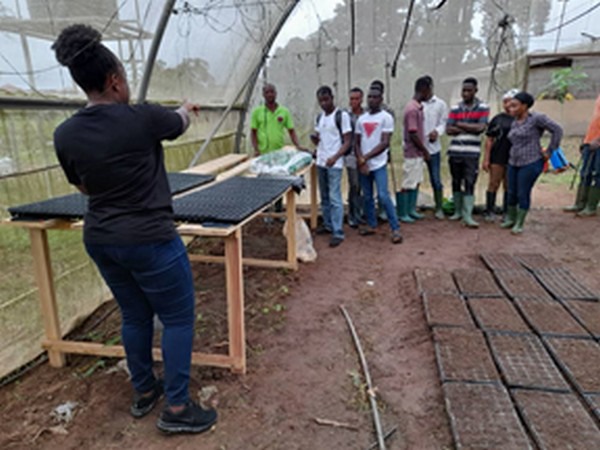
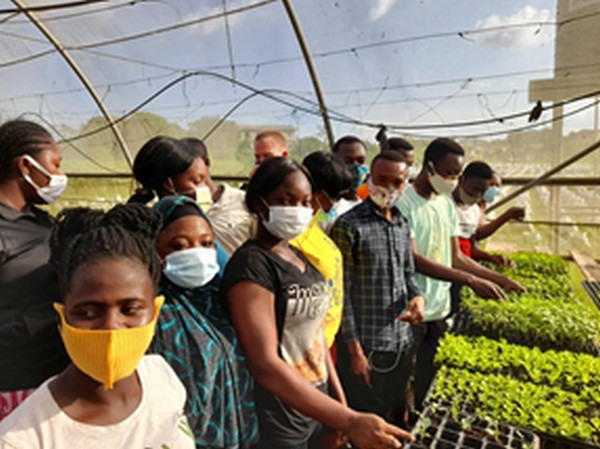 HGT delivers a nursery training at KAC demonstration site.
HGT delivers a nursery training at KAC demonstration site.
Over the course of the Project, lead farmers upscale from a demonstration site of 500 m2 to 1 to 3 hectares depending on local context and market access. Below is an example of developing a lead farmer, in this case Foster Amankwah in Bosomkyekye, Ashanti Region.
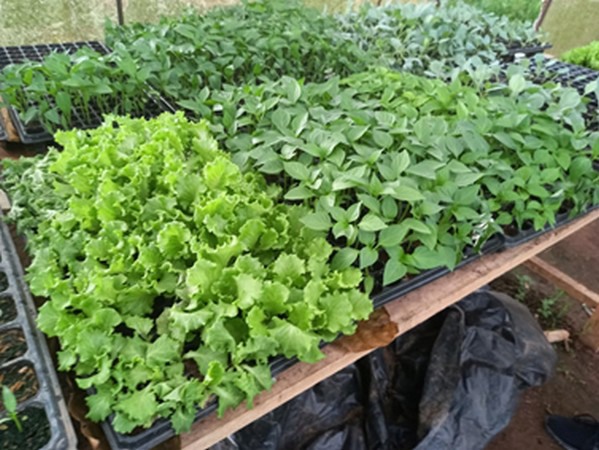
Deborah Anobil Amosah and Collins Adu Safo from Holland Greentech support farmers in Ghana through dissemination of growing techniques, high-quality seeds, irrigation, basic greenhouses and promoting farming as a business.
Extreme weather
“Conditions are becoming more extreme, the climate is changing, and the dry and wet seasons are changing,” says Deborah. “Some areas in the north are becoming arid, while others in the south are faced with heavier and prolonged rainy seasons. A poor harvest can cause problems with food supply, while the population of Ghana is rapidly growing. Supplying Ghana with healthy food in the future will be a challenge. It’s great that providing high-quality vegetable seeds to farmers can help achieve this.” Holland Greentech supplies Rijk Zwaan seeds in Ghana for example.
Rijk Zwaan breeds vegetable varieties that are more resilient and coping better with factors such as drought, disease and pests. A variety that thrives in the Netherlands will probably grow less well in Africa, for example. Rijk Zwaan develops varieties specifically for the various climatic zones in the tropics.
Tomatoes, hot peppers, cucumbers, carrots are all grown in Ghana, mainly on small plots. But how do you further increase the production and incomes of farmers? Through training on agronomic best practices and building leverage in the marketplace.
“Farmers will not adopt new growing techniques or inputs if they cannot see the results with their own eyes” Collins notes. “That is why Holland Greentech sets up demonstration plots with lead farmers and organizes Farmer Field Days in the projects with KAC, TU Delft and KBI.”
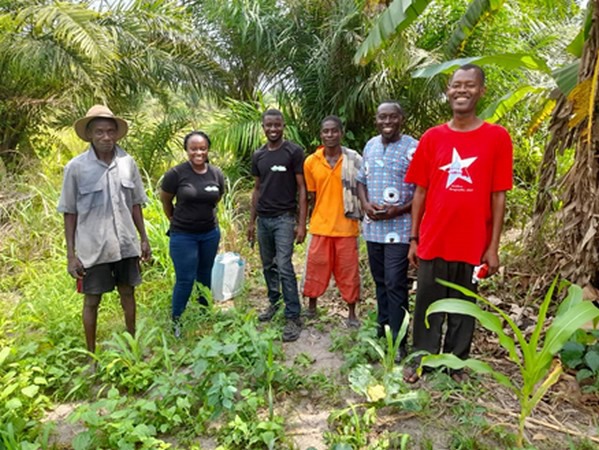 From left to right: Grower Solomon, Ministry of Food & Agriculture extension officer Richmond, leadfarmer Clement Owusu, agronomists Collins & Deborah, right grower Frederick, at Offinso North, Ashanti Region, Ghana.
From left to right: Grower Solomon, Ministry of Food & Agriculture extension officer Richmond, leadfarmer Clement Owusu, agronomists Collins & Deborah, right grower Frederick, at Offinso North, Ashanti Region, Ghana.
These events are organised to for example tell farmers about irrigation, growing seedlings in small trays, how to spread plastic film over beds, and that spacing may mean that you have fewer plants on an area, but you get far more fruit. Pest and disease management, marketing and growers’ associations are also on the agenda when the team visits the farmers.
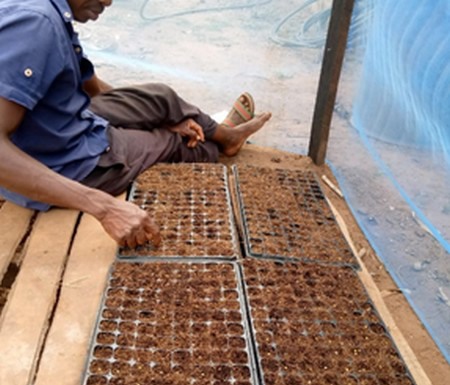 Lazarus at lead farmer Foster Amankwah at Bosomkyekye, Ashanti Region. Preparing seed trays for nursery. Rijk Zwaan varieties of hot pepper, cucumber & cabbage.
Lazarus at lead farmer Foster Amankwah at Bosomkyekye, Ashanti Region. Preparing seed trays for nursery. Rijk Zwaan varieties of hot pepper, cucumber & cabbage.
With improved inputs and services, the yield of growers increases. Next to that, it also contributes to the consistency of production throughout the year. Farmers that make the step to drip irrigation can produce during dry seasons and get a much better price for their products on the market. Simultaneously they contribute to increasing the availability of nutritious vegetables throughout the year.
This creates a commercial business case for African vegetable growers that increases nutrition and is climate-smart. “During the implementation of this project which coincided with the beginning of the COVID-19 pandemic, it has been realized more than ever, the importance of local food supply chains. By accompanying the lead farmers along the way, the project hopes to contribute to local vegetable production in Ghana.
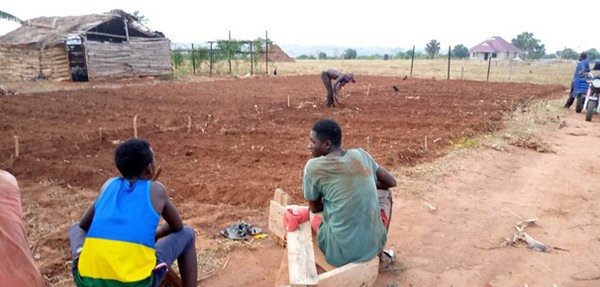 Land preparation and training complete at lead farmer Foster Amankwah in Bosomkyekye, Ashanti Region.
Land preparation and training complete at lead farmer Foster Amankwah in Bosomkyekye, Ashanti Region.
Holland Greentech cannot achieve this without others. They are working closely with partners throughout the value chain that are active in post-harvest, processing and retail to reduce post-harvest losses and help farmers to sell their vegetables for a fair price on the market. According to Deborah, the latter is especially important as “high-quality inputs and increased yield do not mean much to a farmer if his/her produce cannot be sold on the market for a good price”.
Deborah and Collins are confident that the harvest of lead farmers in Ghana will double in value and that the agricultural productivity and incomes of small-scale food producers will increase while creating job opportunities for many youth, women and returnee migrants through this project.
For more information:
Holland Greentech
maarten@hollandgreentech.com
www.hollandgreentech.com
